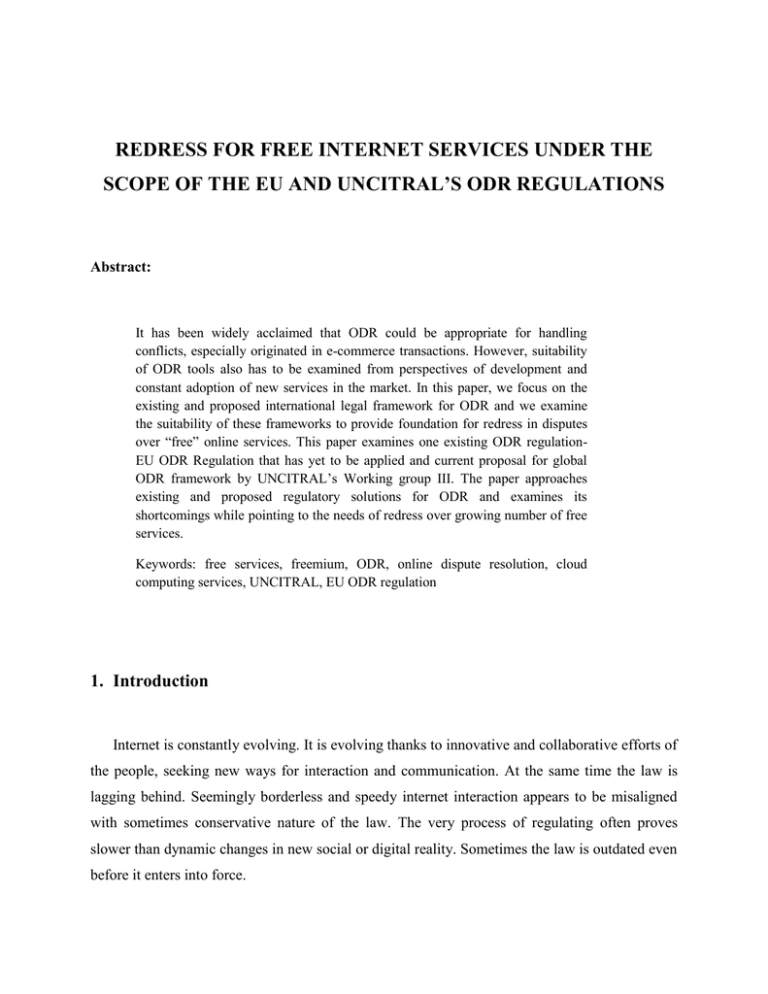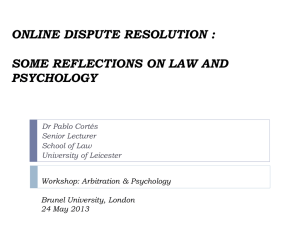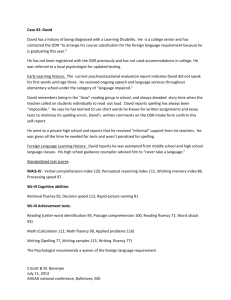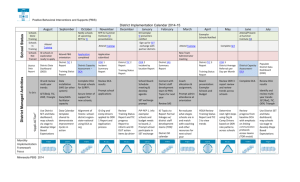34304-46041-1-ED
advertisement

REDRESS FOR FREE INTERNET SERVICES UNDER THE SCOPE OF THE EU AND UNCITRAL’S ODR REGULATIONS Abstract: It has been widely acclaimed that ODR could be appropriate for handling conflicts, especially originated in e-commerce transactions. However, suitability of ODR tools also has to be examined from perspectives of development and constant adoption of new services in the market. In this paper, we focus on the existing and proposed international legal framework for ODR and we examine the suitability of these frameworks to provide foundation for redress in disputes over “free” online services. This paper examines one existing ODR regulationEU ODR Regulation that has yet to be applied and current proposal for global ODR framework by UNCITRAL’s Working group III. The paper approaches existing and proposed regulatory solutions for ODR and examines its shortcomings while pointing to the needs of redress over growing number of free services. Keywords: free services, freemium, ODR, online dispute resolution, cloud computing services, UNCITRAL, EU ODR regulation 1. Introduction Internet is constantly evolving. It is evolving thanks to innovative and collaborative efforts of the people, seeking new ways for interaction and communication. At the same time the law is lagging behind. Seemingly borderless and speedy internet interaction appears to be misaligned with sometimes conservative nature of the law. The very process of regulating often proves slower than dynamic changes in new social or digital reality. Sometimes the law is outdated even before it enters into force. Online dispute resolution (ODR) has appeared as one of the solutions for certain inadequacies of national laws and their application to e-commerce disputes. Even though it is not the only field where it is useful, it has been widely acclaimed that ODR could be appropriate mechanisms for handling conflicts originated in e-commerce transactions. These mechanisms especially seemed appropriate for low-value high-volume buyer-seller disputes. Ethan Katsh believes that the advent of Web 2.0, where users are content creators, will inevitably lead to exponential increase in disputes online (Katsh 2012). According to Katsh, as well as Colin Rule, business of tomorrow will look at ODR as a way to mitigate these disputes and facilitate trust with users (Rule & Nagarajan 2011). In this paper, we focus on the existing and proposed international legal framework for ODR and we examine the suitability of these frameworks to provide redress for disputes over “free” services online. But first we need to clarify what we mean by free services. 2. “Free” services Even though free services have existed long time in the various forms in the commerce their uses were never on the level of the current use of free services on the Internet. Almost every person today uses some form of free online service. This observation alone justifies further examination in the nature and the potential for disputes over these services. In his book, FREE: THE FUTURE OF A RADICAL PRICE (Anderson 2009), Chris Anderson preaches the coming of the dawn of free services. For the purpose of this paper we will consider service that has not been paid directly by the user a “free service”. However, we do not intend to claim these services have no economic value. In fact, there are very often paid by a third party, subsidized on some other way or paid by the user indirectly or through some other form of exchange (i.e. for personal data). These alternative ways of monetizing services are also the answer to how business models based on free services exist, survive and thrive. 2.1. Expansion Since our focus here is on Internet services, we are mostly interested in discussing the origins of digital-online service expansion. Like in most tech industries, the source of fast growth and expansion could be explained by the economic effects of Moore’s law, Kryder’s law and several other laws describing decrease in price through time per unit of production (or increase in rate of production per time units). Moore's law (Moore 1965) is an observation that, over the history of computing hardware, the number of transistors on integrated circuits doubles approximately every 18 months. Therefore, the prices of the circuits (or price of processors) constantly decrease. Kryder’s law (Walter 2005), similarly, explains decrease in prices per storage unit, hence more and more memory is available to us for the same price, either buying bigger hard drives or getting bigger storage space online or in the “cloud”. Butter's law (Gail Robinson & Robinson 2000) illustrates that the amount of data coming out of an optical fiber is doubling every nine months. Nielsen's law (Jakob Nielsen & Nielsen 1998) claims that the bandwidth available to users increases by 50% annually. Similar laws describe other building blocks of Internet and digital economy. The consequences of this rate of production is that we have highly competitive market of services, with low barriers to entry that constantly puts pressure to lower the cost of services and offering more and more of free services. 2.2 Business models Constant lowering of prices, as described above, allowed the development of business models around free services or free offers. Chris Anderson claims that this is natural consequence of speed and growth of production in digital economy, where resources are abundant (as opposed to the physical world) and where speed of distribution is instant and costs of distribution are minimal to nothing (Anderson 2009). Hoofnagle and Whittington (Hoofnagle & Whittington 2013), however claim that “free” is mostly used as an enticement to get consumers to try a product without realizing its costs. They argue that conceiving the transactions as free can be detrimental to consumers and to competition, because there are often hidden charges in these exchanges in form of providing personal information. According to them: Consumers are expected to provide personal information or to devote their attention to the service. The service provider delivers advertising and other services from third parties, such as games, to the consumer. The more time the consumer spends using the service and revealing information, the more the service can tailor advertising and market other products tied to the consumer’s personal information. Hoofnagle and Whittington are also proposing consideration of free services from transactional cost economy’s point of view, which hardly leaves them the qualification “free”. De la Iglesia and Gayo (Iglesia & Gayo 2009) divide these business models in the following categories: advertising, freemium, work exchange and mass collaboration. According to them: advertising model is based on the building of an audience, or better to say in internet terms, a community, to which advertisers will want to offer their products or services; in Freemium model (combination of words free and premium) premium users pay and subsidize the use of everybody; work exchange allows free services in exchange of some work by users; mass collaboration exists because the cost are nearly nothing. Model Freemium Advertising Cost 0 0 Who pays Premium users Advertisers Work exchange 0 Mass Collaboration 0 Service provider or sponsor Donators Volunteers Why Better features Attention of community to its products or services. Getting value from users Altruism Self-promotion Interest Fig 1. Table of Web 2.0 business models (Iglesia & Gayo 2009) 3. Potential for disputes regarding free services Psychological effects of the perception of the free have been recently researched. Some studies found the additional benefit (revenue) that goes with the label “free” (Ariely & Shampan’er 2006; Shampanier et al. 2007). At the same time legal academics have also discussed the potential for deception by the offers presented as free (Friedman 2008). For the purposes of this paper we will not go further into these discussions, but we will focus more specifically on Internet services where we can claim that the mere volume of interaction online is a good indicator of a possibility for a increase in number of disputes (Katsh et al. 2001; Katsh 2002). Free internet services are usually global (or internationally available), easily accessible and hosted from servers whose location is unknown to most of the users. Together with the effects of Moore's law and similar laws, free services expansion coincides with the expansion of cloud computing. Poles on usage of cloud computing services display constant increase in adoption of this technologies and steady growth of industries providing this kind of services (Cloud Industry Forum, 2013). It is also evident that free apps are widely available on app markets for various smartphones and their platforms. Many of them, to work properly, demand internet connection (usually to display ads). In certain cases, we have interesting interaction between free and premium (sometimes paying) users in the new free web-based games. For example, players of free game FarmVille can earn virtual currency by completing tasks or selling crops, but also users can use real money to gain these currencies (Farm Coins and Farm Cash in FarmVille or Farm Bucks in FarmVille 2). However, is the legal treatment of users who earned virtual currency same as treatment of users who purchased virtual currency by real money? While the online dispute resolution has proven to be useful in different areas of commerce and life (Wahab et al. 2012), it has not been as fast at accepting latest advancements in technologies as a tool (Poblet 2011), or developed appropriately for the new “realities” in e-commerce (Rule & Nagarajan 2011). These new conditions in the markets, that Rule mentions, partly relate to the offers of free or cheap online services and inadequacy of most of ODR tools to provide appropriate, quick and cheap dispute resolution. Whether it would be a dispute about faulty virtual good in online game, borrowing of some virtual good or access (Lodder 2006), negative review that someone has posted or block of an account for no apparent reason, the need for appropriate dispute resolution exists in certain cases. We are proposing here to distinguish two forms of disputes: dispute between users of free service and dispute between user and provider of service. Previous research, mostly discuss potential conflicts among users of free services, like negative reviews, privacy claims, IPR claims etc… However, under certain circumstances ODR could be very effective tool and response for the lack of consumer protection, vis-à-vis certain cloud services, free or not (Martic 2014). On the other hand, even courts are puzzled about the free services. How does consumer protection apply and how to deal with them? In United States courts are apt to discount users’ claims against such services. In the recent Facebook case1 a federal court decided, that for alleged transfer of personal information to advertisers that violated a variety of privacy and consumer protection statutes, users of Facebook were not “consumers” under California law (Hoofnagle & Whittington 2013) and thus not entitled to consumer protection. From theoretical point this raises interesting question: are users of free service deprived of legal rights simply because they are not paying for service. On the other hand, the French court of Cassation ruled differently in Mr. Sebastian R v Facebook case, claiming that since users are important source of funding (advertising and freemium model2) and their use of service has economic value, they should be under (certain) consumer legal protection (Cunningham 2013). Having in mind these indicators of different EU-US approach to consumer protection for free service, we will now discuss EU ODR regulation and UNCITRAL’s proposal for global ODR framework giving legal foundation to dispute resolution on a global scale. Both initiatives should have big effect on ODR, as they represent official support and trust of public institutions, as well as a new boost to the global development of ODR. 4. EU ODR Regulation’s consumer protection for free services? EU parliament has recently voted in favor of the proposal on the ADR Directive and ODR Regulation on consumer disputes (EU Parliament, 2013). According to the ODR regulation, the EU ODR platform will be functional by the end of 2015 and it will serve as a portal for filing 1 2 In re Facebook Litigation, 791 F.Supp.2d 705 (N.D. Cal. May 5, 2011) As described in page 4. disputes and finding appropriate ADR to solve them. It will also capitalize on harmonizing effect of ADR directive, which fills the gaps in ADR practices in Member states as well as trying to provide minimum standards for ADR, such as impartiality and professionalism of neutrals etc… EU ODR platform is intended to be single pan-EU starting point for consumer complaints with important role of facilitating dispute resolution by offering applicable and suitable ODR providers for incoming disputes. However, the success of whole endeavor will largely depend on acceptance of businesses to be part to ODR processes. Looking at the text of the adopted EU ODR and ADR regulations we get an impression that the legislator had primarily focused on buyer-seller disputes of products for Internal market. Nominally, legislator addresses services, but our impression is that legislator is mainly having in mind types of disputes for services that were extension of offline services and practices. We do not get the impression that legislator had in mind free services and services connected to it for the reasons expressed bellow. Firstly, the idea that EU has not been fully considering free online services is best illustrated in the definition of the service. If we look at the definition of service contract for ADR directive (ODR regulation refers to it for the definition) it clearly says: “service contract means any contract other than a sales contract under which the trader supplies or undertakes to supply a service to the consumer and the consumer pays or undertakes to pay the price thereof..” (EUROPEAN PARLIAMENT, 2013.) This definition excludes use of EU ODR platform for disputes over free services or freemium model, where economic gains are not coming from consumers paying for the service, but from other possible income models as describe in the previous pages. We could also question the possible interpretation of this definition on free trial periods of the services; free trial is not as committing to payment or undertaking to pay for a service. In the highly competitive markets for certain internet services it is highly expectable that there is free trial period. Similarly to keep the customer loyalty, service providers are often providing other free services that may not be directly connected to one that has been paid. We have to mention that EU ODR regulation primarily is intended to be consumer protection tool and that it applies only to disputes between consumers and traders who are residents of the European Union. Free services, are also most commonly cloud computing services (SaaS3) which are essentially cross-border technology, where its biggest providers are residents of United States. It is common that SaaS model is based on PaaS4 or IaaS5 of a different provider (possibly based outside EU). The service of SaaS is sometimes dependent on SLAs 6 of its provider. Meaning that disruption of service of IaaS (like Amazon Web Services) would lead to disruption of European SaaS’. Consumers of free SaaS being in contractual relationship with only European provider could seek redress for this disruption. This would put free SaaS provider in an awkward situation to be part of the dispute resolution process where it in fact is not responsible for the lack of the service. So unless there is an adequate remuneration from its own provider, SaaS would not easily accept to be part of the process where the majority of its users could seek redress. Maybe EU ODR platform will be only appropriate for EU based cloud providers which are not developed enough compared to the US providers. On the other hand, we could also argue that many US cloud companies who are providing cross borders services, are also being intentionally “shielded” behind disclaimers and limitation of liability offered by the domestic law in order to prevent or make harder access to redress to certain group of users (Martic 2014). Finally, even if we have a free service provider, who accepts to be part in ODR process that some users initiated against him, there could be question of consistency since there is no obligation of business that advertises its acceptance and support for EU ODR platform by placing link to it, that it will actually follow it through and respond to invite by ODR platform. In other words, the service could advertise its willingness to resolve disputes through ODR mechanisms but when it really comes to it, the business will make case-by-case decision to be or not to be the part of the ODR process. This is a general problem of EU ODR regulation - lack of proper mechanism to ensure the acceptance of the processes. In highly competitive markets where different services providers offer similar free services, those who are actually willing to participate to ODR procedure would maybe have to go a step further and offer such option for consumers in terms of service, leaving them sometimes exposed to frivolous claims if they do not specify in details under which circumstances and for what type of disputes they will participate. 3 Software as-a-service, form of cloud computing services Platform as-a-service 5 Infrastructure as-a-service 6 Service Level Agreement 4 5. UNICTRAL's work in progress At its forty-third session in New York, in 2010, United Nations Commission on International Trade Law (UNICTRAL) agreed that a Working Group should be established to undertake work in the field of online dispute resolution (ODR) relating to cross-border electronic commerce transactions, establishing Working group III to deal with this matter. In following forty-fourth session the Commission reaffirmed the mandate of the Working Group in respect of low-value, high-volume cross-border electronic transactions( UNCITRAL's WG III, 2013). UNCITRAL Working group III has recently held its 28th session7, discussing the idea of establishing internationally accepted and trusted normative framework for ODR. The latest development has led to dual track approach, where countries could opt between two regimes. One regime accepts binding predispute arbitration agreements for consumers and ultimately end ODR process in binding arbitrations and other that does not and ends in neutral’s recommendation. We will not discuss here the eventual outcomes of the UNCITRALs work as it is still far from concrete results. UNCITRAL does not distinguish B2B and B2C disputes, but propose single (double tracked) process for both B2B and B2C disputes. Many of the issues are still lingering, and it is difficult to assess what will be the final outcome. However we will focus on WG III's approach to the definition of low value. In the latest session, connected to the term “low-value” in the preamble, diverging views were expressed in relation to whether that term ought to be defined. It was also pointed that providing a definition would increase clarity as to when the Rules applied, and was said to be particularly relevant in that context from a consumer-protection standpoint.(UNCITRAL's WG III, 2013) On the other hand, it was said that creating a definition would be exceedingly difficult, especially because the definition of “low-value” could change over time and across borders, therefore they decided not to include the definition in the Rules, but to set it out in follow through Guidelines. However, in the scope of application it is specified: "These Rules shall only apply to claims: 7 18-22 November 2013, http://www.uncitral.org/uncitral/commission/working_groups/3Online_Dispute_Resolution.html (a) that goods sold or leased [or services rendered] were not delivered, not timely delivered, not properly charged or debited, and/or not provided in accordance with the agreement made at the time of the transaction; or (b) that full payment was not received for goods [or services] provided." (UNCITRAL's WG III, 2013) The scope of application narrows the types of possible disputes in e-commerce. Looking from the aspect of free services, we exclude the possibility of disputes for service not properly charged or debited(a), services not provided in accordance with the agreement made at the time of the transaction (since the transaction did not occur)(a) and disputes when that full payment was not received for service(b). The second type could be possible if we interpret transaction from the point of view of transactional costs economies, which is probably not the intention of authors of the proposal. The third type is particularly narrowing if we consider B2B free services. For example, some internet services (cloud services, SaaS) providers define Acceptable Use Policies, which are in-house rules that users have to follow (i.e. forbidding activities leading to breach of intellectual property rights etc.). In case of the breach the provider takes actions (like suspending account, deleting files...). We could imagine the use of ODR as well in these cases where the breach of UAP has led to some consequences to service provider or if provider seeks to justify its harsh action. Free services are included only for the disputes of non delivery and late delivery, which do not look as plausible cause for many cases. The applicability to some types of disputes is excluded as the scope of application is oriented on disputes around payments. We would argue that "low value" is actually "low price". But in the age of Web 2.0 and growth of free services, is this conception of low value suitable for today's eservices? 6. Private vs. public initiatives Both EU and UNCITRAL proposal face criticism for lack or inappropriate enforcement, lack of incentives for traders in general and questionable effects of certain provisions. Many questions remain. How should we deal with freemium model? Do consumers of free services deserve consumer protection, and if they do how to provide it in global internet services. How do we factor loss of the control, risk of data protection/privacy in these B2C or even B2B contracts? Private ODR initiatives have proven to be very effective tool for resolving disputes, when certain conditions are met. The ways EBay and PayPal handle dispute (Wahab et al. 2012; Rule 2002) are examples of private ODR initiative within service provider or a community. Both, EBay and PayPal, have high success rate in handling disputes between their users. As we mentioned before, we could distinguish the type of disputes between services and users from the disputes between users. Here, we have an unequal negotiation power from very start. The question of impartiality of private ODR providers when handling such reoccurring disputes of a big service provider could always intrigue and raise suspicion. For handling these kinds of disputes public initiatives could be perceived more legitimate and impartial. We believe that following condition need to be fulfilled to have successful independent ODR system for free services: Legal certainty in providing free services (clear legal rules), Legal framework for ODR to support dispute resolution over free services, Incentives for parties (providers and users), Appropriate ODR mechanisms (innovation in technology supporting ODR, free or low cost ODR business model etc.) We have exemplified some inadequacies in existing ODR regulation (in the EU) and in proposals for global legal framework (UNCITRAL). Maybe solutions lies in sector specific ODR for specific service or to try to find ways to incentivize providers even though they have not shown any interest in ODR so far for possible outcomes of these initiatives. While we do not pay the money for the use of some service or software, we certainly pay in the amount of time, attention and effort we give to the service. The fact that we use it has a reputation aspect that could finally, from the business point of view, transform into "network effect". The trust of users is essential for network, so could we consider ODR as a trust building tool for these services? That remains to be further researched. 6. Conclusion The purpose of this paper was to point out to some inadequacies of certain regulatory solutions for ODR rules and schemes from the aspects of growing online business model of free services. How should we deal with consumer ODR for services using freemium or other business models for free services? Are users of free services entitled to consumer protection? While we do not pay the money for the use of some service or software, we certainly pay in the amount of time, attention and effort we give to that service or business. The EU is excluding free service by the mere definition of the service. UNITRAL's Working Group III is designing global legal framework for providing redress for the services, but does not leave much room for the dispute over free services. Since their final proposal remains to be seen, the fact that big number of services in today's e-commerce falls under the category free should at least effect some modifications in the way the proposal defines the scope of application. We need legal framework for ODR to support dispute resolution over free services to allow independent, accessible and easier global access to redress. These issues should be given closer look in future if we want to use ODR to answer on need for redress over otherwise easily accessible services. Even if we are protected in some cases by other laws (i.e. in domain of privacy), maybe we should reconsider giving choice or additional tool to handle conflicts and problems in our interactions with free online services, and not rely solely on efficiency and accessibility of national courts in these cases. References Anderson, C., 2009. Free: The Future of a Radical Price, Hyperion. Anon, EUROPA - Consumers Affairs - Redress - Alternative Dispute Resolution (ADR). Available at: http://ec.europa.eu/consumers/redress_cons/adr_policy_work_en.htm. Anon, United Nations Commission on International Trade Law, Working Group III. Available at: http://www.uncitral.org/uncitral/commission/working_groups/3Online_Dispute_Resolution. html. Ariely, D. & Shampan’er, K., 2006. How small is zero price? The true value of free products. Cloud Industry Forum, 2013. UK Cloud adoption and trends for 2013. , (8). Cunningham, A., 2013. Caveat Consumer?–Consumer Protection and Cloud Computing–Part 1. Consumer Protection and Cloud Computing–Part, (130). Friedman, D., 2008. Free Offers: A New Look. New Mexico Law Review. Available at: Gail Robinson & Robinson, G., 2000. Speeding net traffic with tiny mirrors, EE Times. Hoofnagle, C.J. & Whittington, J., 2013. The Price of “Free”: Accounting for the Cost of the Internet’s Most Popular Price. Available at: http://papers.ssrn.com/abstract=2235962 [Accessed February 6, 2014]. Iglesia, J. de la & Gayo, J., 2009. Doing business by selling free services. Web 2.0. Jakob Nielsen & Nielsen, J., 1998. Nielsen’s Law of Internet Bandwidth, Alertbox. Available at: http://www.useit.com/alertbox/980405.html [Accessed February 6, 2014]. Katsh, E., 2012. ODR : A Look at History. In Online Dispute Resolution: Theory and Practice: A Treatise on Technology and Dispute Resolution. pp. 21–33. Katsh, E., 2002. Online dispute resolution: The next phase. Available at: https://papyrus.bib.umontreal.ca/xmlui/handle/1866/9406 [Accessed February 7, 2014]. Katsh, E.E., Katsh, M.E. & Rifkin, J., 2001. Online Dispute Resolution: Resolving Conflicts in Cyberspace. Lodder, A., 2006. The Third Party and Beyond. An analysis of the different parties, in particular The Fifth, involved in online dispute resolution. Information & Communications Technology Law, 15(2), pp.143–155. Martic, D., 2014. Online Dispute Resolution for Cloud Computing Services. In ceur-ws.org. ceur-ws. Available at: http://ceur-ws.org/Vol-1105/paper2.pdf [Accessed January 30, 2014]. Moore, G.E., 1965. Cramming more components onto integrated circuits, Electronics Magazine. Poblet, M. ed., 2011. Mobile Technologies for Conflict Management, Dordrecht: Springer Netherlands. Rule, C., 2002. Online Dispute Resolution For Business: B2B, ECommerce, Consumer, Employment, Insurance, and other Commercial Conflicts, Jossey-Bass. Rule, C. & Nagarajan, C., 2011. Crowdsourcing Dispute Resolution over Mobile Devices M. Poblet, ed. Mobile Technologies for Conflict Management, pp.93–106. Shampanier, K., Mazar, N. & Ariely, D., 2007. Zero as a special price: The true value of free products. Marketing Science. Wahab, M.S.A., Katsh, E. & Rainey, D., 2012. Online Dispute Resolution: Theory and Practice: A Treatise on Technology and Dispute Resolution, Eleven International Publishing. Walter, C., 2005. Kryder’s Law. Scientific American. Available at: http://www.scientificamerican.com/article.cfm?id=kryders-law&ref=sciam [Accessed February 6, 2014].




